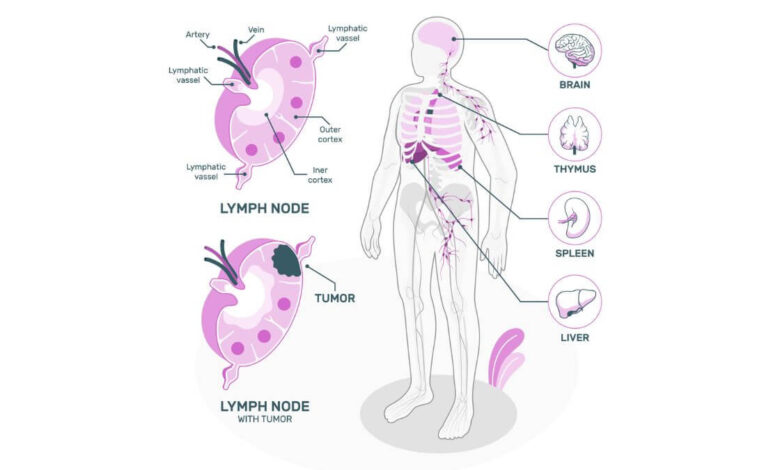
Lymphoma is a type of cancer that affects the lymphatic system, a vital part of the body’s immune system. This article aims to provide a comprehensive understanding of lymphoma, including its types, causes, symptoms, and treatment options. We will explore the different approaches to coping with lymphoma and the importance of emotional support during the journey to recovery. Furthermore, we’ll discuss the latest research and promising clinical trials, offering hope to those facing this challenging disease.
What is Lymphoma?
Lymphoma is a malignant condition that originates in the lymphocytes, a type of white blood cell found in the lymphatic system. The lymphatic system plays a crucial role in filtering toxins and waste products from the body while supporting immune responses. When lymphocytes mutate and grow uncontrollably, they form tumors, which can affect lymph nodes, spleen, bone marrow, and other organs.
Types of Lymphoma
1 Hodgkin Lymphoma
Hodgkin lymphoma is a rare form of the disease, accounting for approximately 10% of all lymphoma cases. It is characterized by the presence of Reed-Sternberg cells, large abnormal cells found in the affected lymph nodes. Hodgkin lymphoma is often divided into two subtypes: classical Hodgkin lymphoma and nodular lymphocyte-predominant Hodgkin lymphoma.
2 Non-Hodgkin Lymphoma
Non-Hodgkin lymphoma is a more common type, making up around 90% of lymphoma cases. It encompasses various subtypes, each originating from different types of lymphocytes. Non-Hodgkin lymphoma can be further classified as indolent or aggressive, based on its growth rate and behavior.
Causes of Lymphoma
1 Genetic Factors
Certain genetic mutations and family history may increase the risk of developing lymphoma. Individuals with a family history of lymphoma or other blood-related cancers should be vigilant and undergo regular screenings.
2 Environmental Triggers
Exposure to certain environmental factors, such as pesticides, herbicides, and chemicals, may be linked to an increased risk of lymphoma. Living or working in environments with prolonged exposure to these substances should be taken into consideration.
3 Immune System Disorders
Individuals with compromised immune systems, either due to autoimmune diseases or organ transplants, are more susceptible to lymphoma.
4 Viral Infections
Some viral infections, such as Epstein-Barr virus (EBV) and human immunodeficiency virus (HIV), have been associated with an increased risk of lymphoma.
Recognizing the Symptoms
Lymphoma symptoms can vary depending on the type and stage of the disease. Common symptoms include:
1 Enlarged Lymph Nodes
Painless swelling of lymph nodes in the neck, armpits, or groin is a typical early sign of lymphoma.
2 Fatigue and Weakness
Persistent fatigue and weakness that do not improve with rest may indicate lymphoma.
3 Unexplained Weight Loss
Sudden and unexplained weight loss can be a warning sign of lymphoma.
4 Night Sweats
Frequent drenching night sweats are often reported by lymphoma patients.
5 Fever and Chills
Unexplained fever and chills may be indicative of lymphoma.
6 Itchy Skin
Persistent itching without a known cause should be evaluated.
Diagnosis and Staging
To diagnose lymphoma accurately, a series of tests and examinations are performed.
1 Physical Examination
A thorough physical examination is conducted to check for enlarged lymph nodes and other physical signs.
2 Biopsy and Imaging Tests
A biopsy of the affected lymph node or organ is performed to determine if cancer is present. Imaging tests like CT scans and PET scans help stage the disease.
3 Staging the Disease
Staging helps determine the extent and severity of lymphoma, aiding in treatment planning.
Treatment Approaches
The treatment approach for lymphoma depends on its type, stage, and the patient’s overall health.
1 Watchful Waiting
In certain cases, observation and close monitoring may be preferred, especially for indolent lymphomas.
2 Chemotherapy
Chemotherapy uses drugs to kill cancer cells and is one of the primary treatment options for lymphoma.
3 Radiation Therapy
Radiation therapy targets and destroys cancer cells with high-energy rays.
4 Immunotherapy
Immunotherapy stimulates the body’s immune system to recognize and attack cancer cells.
5 Stem Cell Transplant
A stem cell transplant may be performed to replace damaged bone marrow with healthy cells.
6 Targeted Therapy
Targeted drugs are used to attack specific cancer cells without harming healthy cells.
Coping with Lymphoma
A lymphoma diagnosis can be emotionally challenging, and coping strategies are essential.
1 Emotional Support
Seeking emotional support from friends, family, or support groups can help ease the burden.
2 Nutritional Guidance
A balanced diet tailored to individual needs can support the immune system during treatment.
3 Exercise and Physical Well-being
Regular exercise, based on medical advice, can improve physical strength and overall well-being during lymphoma treatment.
4 Alternative Therapies
Complementary therapies such as yoga, meditation, and acupuncture may aid in managing treatment side effects and promoting relaxation.
Promising Research and Clinical Trials
Ongoing research and clinical trials are continually advancing the understanding and treatment of lymphoma. Participating in clinical trials may offer innovative treatment options for eligible patients.
Survivorship and Follow-up Care
Survivorship begins after completing lymphoma treatment. Regular follow-up visits and health screenings are crucial to monitor for recurrence and address any potential side effects.
Support for Family and Caregivers
Lymphoma not only impacts patients but also affects their loved ones. Support groups and counseling can assist families and caregivers in navigating the challenges of supporting someone with lymphoma.
Risk Factors and Prevention
While some risk factors for lymphoma cannot be altered, individuals can take steps to reduce their risk:
Maintaining a healthy lifestyle, including a balanced diet and regular exercise.
Avoiding exposure to known environmental toxins when possible.
Following recommended vaccination guidelines to protect against certain viral infections.
Lymphoma is a complex and potentially life-changing disease, but advances in medical research and treatments offer hope and improved outcomes for patients. Early detection, timely treatment, and a strong support system play vital roles in the journey to recovery. By staying informed, seeking medical attention when necessary, and prioritizing self-care, individuals can better navigate the challenges of lymphoma and emerge stronger.
FAQs (Frequently Asked Questions)
- Can lymphoma be cured completely?
While some cases of lymphoma can be cured, the outcome depends on various factors, including the type and stage of the disease and the individual’s response to treatment.
- What are the long-term effects of lymphoma treatment?
Lymphoma treatment can have both short-term and long-term effects. Some may experience lingering side effects, while others may recover fully after treatment.
- Is lymphoma hereditary?
While lymphoma can sometimes have a genetic component, most cases are not directly hereditary. Family history may increase the risk, but it does not guarantee the development of lymphoma.
- How can I support a loved one with lymphoma?
Offer emotional support, be a good listener, and help with practical tasks. Encourage them to seek professional support and join support groups.
- Are there alternative treatments for lymphoma?
Complementary therapies can be used alongside conventional treatments to manage symptoms and improve well-being. However, they should not replace standard medical care.



